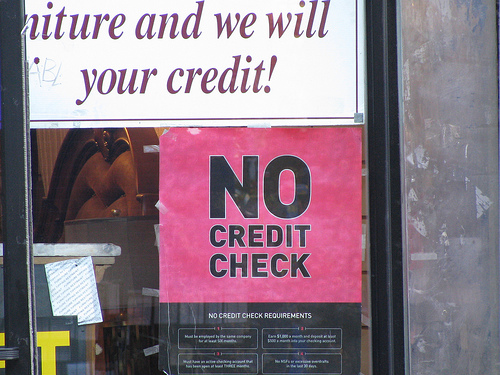Avoid Getting Fired Before You Get Hired
As if the nation’s 14.5 million jobless didn’t have it bad enough already, The New York Times now reports that employers are turning to credit checks to screen hires. The implication? Keep your credit squeaky clean, or suffer the consequences. It has never been more important to be proactive when it comes to personal finances.

Talk about scary. According to the Kansas City Star, roughly 5 million out of work Americans have been searching for at least six months. As many as 1.5 million of those hard-luck cases could exhaust their unemployment insurance by year’s end, the Times reports. Raise the barriers for these job seekers via credit checks and they could end up on the street, draining still more spending from a sluggish, consumer-dependent economy.
Kicked to the curb by Uncle Sam?
Employers quoted in the Times story say they have a right to protect themselves from employees who have a history of poor decision making, the sort who spent with blinders on till they went bust. They’re right, of course. There’s just one problem: bankruptcy doesn’t always equal unemployable. Jim Spiewak II went bust before age 25 and today is a financial advisor and entrepreneur who helps twentysomethings to avoid fiscal disaster via the education site, FinancialYoung.com.
Regulators have begun to turn a skeptical eye towards credit-checking employers and some states, such as Hawaii, are placing restrictions on their use in hiring. But these efforts are in the beginning stages. If you’re looking for work right now, assume that you will be subject to a credit check and prepare accordingly.
How? Here are three tips for impressing your future boss, even if your credit history is less than impressive.
1. Get reference letters from your creditors
Only seven years of financial perfection can erase a bankruptcy filing from your credit history, but you can rebuild your reputation in the meantime by fostering relationships with your bank and your creditors. Ask them to write you a reference letter describing how you pay on time — or better yet, early — and how they’re happy to have you as a customer.
2. Keep your debt to available credit low
Good creditors use only what they need, when they need it. That means never charging your card to the limit. If you’ve a checkered credit history, chances are you’ve already made this mistake at least once. But it’s never too late to start over. Pick a card and concentrate all available cash to pay down the balance to well below your limit. Continue till all your debts are paid. Creditors will love that you’re responsible — a steady source of income for them — and you’ll be better prepared to handle the financial stress of an emergency should one occur. Also, you’ll have an easier time getting a reference letter.
3. Be careful with closing accounts
Although it sounds counter-intuitive, don’t close accounts unless they’re toxic. Here, “toxic” refers to that irredeemable bunch that charges you 30% on the pizza you forgot to pay cash for. Deep six these loan sharks immediately. Keep the more modest card that charges you 9%. Why? Fewer accounts means less available credit, and consumers with less available credit tend to be tagged as a higher credit risk. (See above.)
Today’s job market is tighter than it has been in years. But there are employers out there still hiring. They’re just hiring more carefully than before, so scrub up before the interview. In today’s economy, a clean credit report is more important than a clean shave or shined shoes.
Quicken has made the material on this blog available for informational purposes only. Use of this website constitutes agreement to our Terms of Use and Privacy Policy. Quicken does not offer advisory or brokerage services, does not recommend the purchase or sale of any particular securities or other investments, and does not offer tax advice. For any such advice, please consult a professional.


